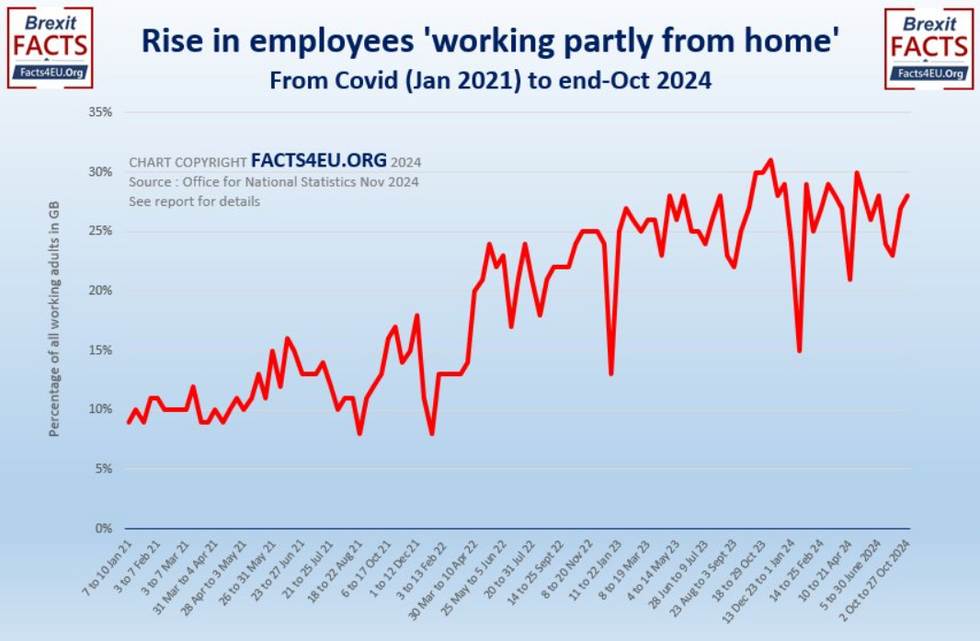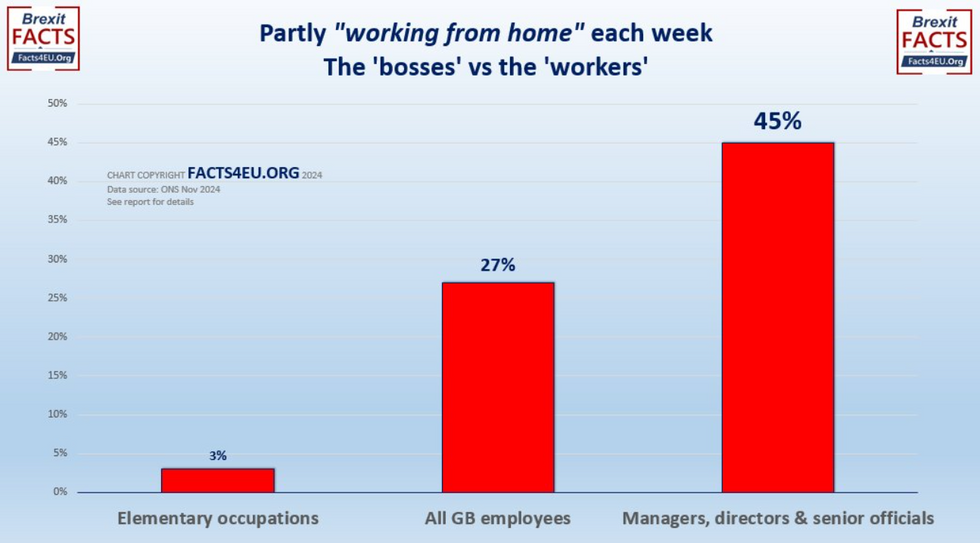Latest ONS data has revealed the levels of ‘hybrid working’ across Britain two years since the vast majority of Covid-19 restrictions were lifted.
The data, compiled in partnership with Facts4EU, shows that more than a quarter of Britons were ‘partly working from home’ in the autumn of 2024, a figure that has trebled since the Covid pandemic.
The levels of employees working 'partly from home' in Britain
Facts4EU
The statistics show people working ‘only from home’ has fallen since the pandemic, meaning most workers returning to the office have only done so partially, hence the moniker ‘hybrid working’.
But hybrid working levels differ according to what job you perform, namely whether you are a worker or a boss.
Analysis of the data showed 45 per cent of ‘managers, directors and senior officials’ work from home compared to the 27 per cent national average.
The difference between workers and bosses when it comes to WFH is stark
Facts4EU
At the other end of the spectrum, jobs that require physical effort and the use of hand tools unsurprisingly recorded the lowest level of work from home at just three per cent.
Despite many of these jobs being relatively low paid like cleaning, hospitality and retail, it is these workers who must foot rising commuter bills just to get to work, not to mention hours spent on the train, bus or behind the wheel.
Analysis by UK Virtual Business Assistant firm SpareMyTime found the average commuter has to spend £2,616 a year on getting to work, or £5,102 if they’re in London.
This was thanks to the cost of train tickets, bus tickets, fuel, parking, low-emission charging zones and lunch all increasing faster than wages.
Critics of work from home point out it is the lower paid, younger and more physically active workers who are being unfairly left behind in the hybrid working world as managers remain at home, eat lunch in their kitchen and accept parcels during the working day.
The ONS figures also showed you are more likely to enjoy working from home if you are over 30, a parent, or someone with higher education qualifications.
LATEST FROM MEMBERSHIP:
- Trump destroyed the Democrats on four key issues and Europe is about to suffer the same fate - John Redwood
- Slavery reparations are blatant opportunism and Britain must reject them for three reasons - William Clouston
- Why the Trump administration is branding Biden's decision to arm Ukraine with missiles 'insane'
29 per cent of workers aged 30 years and older followed a hybrid working pattern, compared with 19 per cent for those aged 16 to 29 years old, according to the Opinions and Lifestyle Survey.
Similarly, working parents were more likely to hybrid work (35 per cent) compared with working non-parents (24 per cent).
The most common reason employers cite for working from home is increased ‘employee wellbeing’.
In competitive industries, work from home is seen as a vital tool to recruit and retain talent looking for better work/life balances. It is rapidly becoming the 'new normal'.
But critics have questioned the efficacy of working from home while many have taken aim at high levels of hybrid working in the taxpayer funded civil service.
They argue allowing civil servants to work from home is not value for money as it is less efficient.
A quick scan of the Government's Civil Service jobs website reveals several high paying jobs offering 'flexible working' including a No 10 Policy Advisor earning up to £162,000pa.
Other jobs offering 'flexible working' include directors in Border Force earning up to £140,000 each and a Director of 'Employee Experience and People Performance' earning £98,000, alongside gold-plated pensions, generous holidays and extensive employee benefits.
Under current guidance, Civil Service staff are expected to spend 60 per cent of their time working in their office - unless they’re on official business.
The Cabinet Office recently confirmed there are no plans to change the 60:40 guidance in a win for the Civil Service Unions.
GB News presenter Jacob Rees Mogg famously led a campaign to get Civil Servants back in the work place when he was Minister for Brexit Opportunities and Government Efficiency.
The former MP left notes on empty Civil Servant's desks saying: "Sorry you were out when I visited. I look forward to seeing you in the office very soon."

 By GB News (World News) | Created at 2024-11-18 12:46:13 | Updated at 2024-11-24 20:37:11
6 days ago
By GB News (World News) | Created at 2024-11-18 12:46:13 | Updated at 2024-11-24 20:37:11
6 days ago










